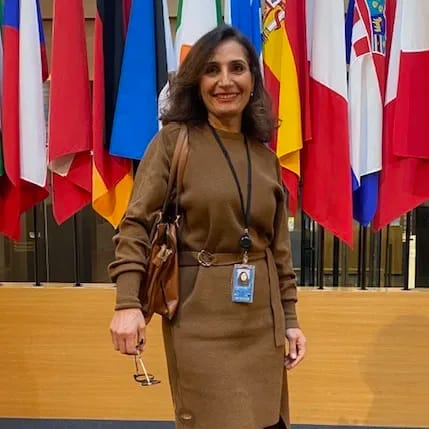
English-Persian (Farsi) Conference Interpreter
Afsaneh Ghashghaie Nia – Qualified and experienced English-Persian (Farsi) conference interpreter.
🌍 Based in London, United Kingdom, available anywhere, remotely or in person.
I work as an Interpreter in both consecutive and simultaneous mode and as a cultural consultant assisting with mediation, negotiation, problem solving and dispute resolution. I regularly work with highly sensitive material, which is why I am security checked and vetted to the highest level.

Holistic approach
My clients welcome my ability to holistically combine linguistic skills, cultural awareness and subject expertise. If asked to share my observations, I can also help identify issues and challenges in a communicative process.

Excellent communication
Throughout my work, I have developed a passion for making sure that communication is always excellent between people, no matter what the subject matter and setting. I specialise in bridging linguistic and cultural divides.

Cultural awareness
Having worked in around 25 countries, and lived on three different continents, I have been exposed to a huge amount of different cultures, and constantly use and develop my keen cultural awareness.
What have been your biggest career highlights as an English-Farsi conference interpreter?
I have worked for many organisations and governmental bodies including the European Union, the European Commission, the U.S. Department of Commerce and The London Court of International Arbitration (LCIA).
Although I have done lots of high profile jobs, every single case is special to me. Every case is unique and you always learn something you didn’t know before. I particularly enjoy cases where I’m able to facilitate the process, and the client achieves their objectives because of the service I have provided.
Some jobs involve working with very difficult subject matter and with people who have had terrible experiences. This work is very difficult but it is also very important, and that makes it special too.
Every time I do an interpreting job, I benefit from the experience of previous work but I also approach it as if it’s my first ever assignment. I can honestly say that every case is a career highlight!




English-Persian (Farsi) Conference Interpreter
In my role as an English-Farsi conference interpreter, my primary goal is to align seamlessly with my client’s objectives. This entails not only echoing their voice but also minimizing any disruptions in the flow of information exchange.
Is there a difference between the Persian language and Farsi?
Persian and Farsi are often used interchangeably, but there’s a subtle difference. Persian is a broader term that refers to the language spoken in Iran, Afghanistan, and Tajikistan.
On the other hand, Farsi specifically denotes the Persian language as spoken in Iran. So, Farsi is a subset of the Persian language. It’s like saying “Persian” when talking about the language in general, and “Farsi” when referring to the specific version spoken in Iran.
How did you become an English-Farsi simultaneous interpreter?
I first thought about getting into interpreting work as a young adult when I observed the need for more professional interpreters in my local community. There was a lack of good interpreting services for the community, and I recognised the need for the service giver and receiver to understand each other fully, with no infiltration.
I especially wanted to give a voice to women and other marginalised groups. I started working as an advocate with many governmental and non-governmental organisations, and once I’d started I got more and more involved.
I have also always been curious about human behaviour and what compels people, for example, refugees. I took a diploma in intercultural therapy while doing my advocacy work, and it really opened my eyes to the detailed concept of migration.
I created guidance for the community on how to effectively work with interpreters and how to make sure the interpreter you’re working with is properly trained, which was a loose concept at the time. Untrained interpreters could even end up needing psychological support themselves as they might get emotionally involved in difficult cases.
This demonstrated the need for my ‘golden rule’ of maintaining clear boundaries, impartiality and unbiased direct interpreting. The interpreter is a crucial part of the communicative network but should ‘only’ be interpreting – not interfering.
Assisting solicitors during conferences with their clients set me on the path to several certifications and qualifications, eventually leading up to my Diploma in Public Service Interpreting in 2002, Diploma in Police Interpreting and joining the NRPSI, APCI as well as becoming a Chartered Linguist.
Around that time, I began to do more complex interpreting assignments, such as Home Office interviews, Asylum and Immigration Tribunals, law and enforcement, and international tribunals including on human rights in Nuremberg which became a case law.
What helped you most to get to where you are now?
My persistence and curiosity have kept me going throughout my career. I crave knowledge and am constantly working on myself, focussing on education across different fields. This includes not ‘just’ my interpreting and linguistic skills, but also the specialist subject areas I work with.
This, in turn, makes me even more curious, and so the cycle of continuous learning goes on. This is critical to maintaining my effectiveness as a conference interpreter where knowledge and rigorous research are of immense importance.
The positive professional relationships I have with people have also been very helpful. I am a “people person” and like to build trust through good communication. This is only possible with effective preparation for all my work, and belief in my abilities.
Having and applying my innate understanding of the culture I’m working in is vital; not just of the country’s culture but also the culture within the organisations I’m working in. I always try to be fully aware of the situation and adjust my mindset to full concentration on the task at hand.
What does a typical day of a Persian / Farsi conference interpreter look like?
The beauty is that there is no such thing as a typical day. You might be working in a different place each day of the week. As well as interpreting I also offer English-Farsi and Farsi-English translation and proofreading services, which are more ‘static’ but have many priorities in common with interpreting, including the fundamental importance of time management.
My background in psychology helps me adjust my behaviour to who I’ll be meeting. For example, if I’m working with a child, I will dress less formally and sit on a lower chair to feel more approachable. Fitting into the environment I’m working in is important, both in terms of the setting, such as a law court and the cultural norms of the country where the work is taking place.
A ‘typical day’ always involves mental dexterity, speed of thought, concentration and fitting into the setting I’m working in to avoid distracting from the subject matter in any way, and carefully managing my time to deliver what I’m working on today and prepare for what I’ll be working on tomorrow.
When conference interpreting in particular, you need to control your nerves. Because of that, I try to maintain calm in my life both in and out of work. I spend lots of time in nature. This helps me relax in my free time and I believe it improves my concentration when I’m back at work.
What do you like best about conference interpreting?
A natural researcher and ‘seeker’, I love to learn and try to always excel and gain knowledge in current affairs and events. With conference interpreting you learn new things from every single case, as each is unique.
It is also really exciting to work in the booth, and I find the process very rewarding. Helping to facilitate a communicative process is a win-win situation.
What are the biggest challenges when working as an English-Farsi conference Interpreter?
One of the beauties of the job is that it has a lot of challenges! I enjoy challenges as I love learning and am constantly trying to improve and excel. When you feel you are as prepared as well as you can be for a new challenge, it is no longer intimidating. Confidence is critical and comes from preparation, research, knowledge and experience.
Conference interpreting really takes your language skills to the next level, combining them with specialist subjects, concepts and scenarios. Conference interpreting is provided simultaneously to the speech that is being interpreted, making it very complex to listen and speak at the same time.
What advice would you give to someone who wants to become a simultaneous conference interpreter?
You have to be completely non-judgemental, respect your professional boundaries, and keep your personal experiences from interfering in any way in your work.
It’s important to keep your objectives clear, know why you’re there, and be prepared so you can perform to the best of your ability. Confidentiality is naturally fundamental, as is the Code of Conduct, professional ethics and collegiality.
Afsaneh Ghashghaie Nia – English-Farsi Conference Interpreter
My persistence and curiosity have kept me going throughout my career. I crave knowledge and am constantly working on myself, focussing on education across different fields.
Are you looking for a Persian (Farsi) conference interpreter?
Please send me a message.











Add a Comment